
– 18-02-2024 –
Gospel reading: Mark 1:12-15
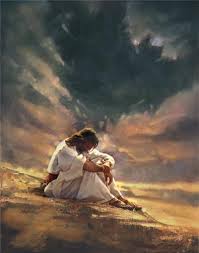 vs.12 The Spirit drove Jesus out into the wilderness
vs.12 The Spirit drove Jesus out into the wilderness
vs.13 and he remained there for forty days, and was tempted by Satan. He was with the wild beasts, and the angels looked after him.
vs.14 After John had been arrested, Jesus went into Galilee. There he proclaimed the Good News from God.
vs.15 “The time has come” he said “and the kingdom of God is close at hand. Repent, and believe the Good News.“
*******************************************************************
We have four commentators available from whom you may wish to choose . Scroll down to the name of the commentator.
Michel DeVerteuil : A Holy Ghost Father, late director of the Centre of Biblical renewal .
Thomas O’Loughlin: Professor of Hist. Theology Uni of Nottingham NG7 2RD
Sean Goan: Studied Scripture in Rome, Jerusalem and Chicago, USA
Donal Neary SJ: Editor of The Sacred Heart Messenger and National Director of The Apostleship of Prayer.
****************************************
Michel De Verteuil
Lectio Divina with the Sunday Gospels
www.columba.ie
General Comments
St Mark’s account of the temptation in the wilderness is very short, just two verses. The Church has added two later ones and these give us the option of meditating on a second moment in the life of Jesus – the beginning of his public ministry.
We look first at the two central verses (12 and 13) which belong to the original tempting of Jesus in the wilderness.
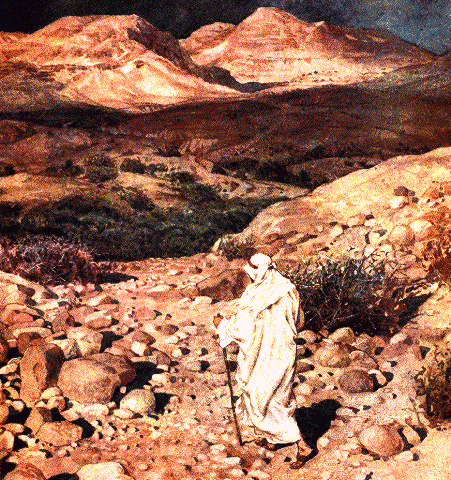 The Bible tells us first that it was “the Spirit” who “drove Jesus into the wilderness”.
The Bible tells us first that it was “the Spirit” who “drove Jesus into the wilderness”.
Jesus was not there because of some minor instruments like the circumstances in which he found himself. Far less was it the work of a spirit that we might label as “false”; it was “the true Spirit” who drove Jesus into the wilderness.
God himself was in charge of what was happening to Jesus; it was clearly a force which was there to bring him the greatest good he could hope for.
The text also tells us that the Spirit made this move “immediately”, that is right after what went before. What had happened before was God’s Spirit coming on Jesus in a movement of renewal. God appeared to him where he stood at the banks of the Jordan, shortly before he moved to take on his work by going to Capernaum and starting his ministry there.
The moment of being tested therefore happened “immediately” after the moment of purity. It was a realistic movement, a healthy opposition to the coming of the Spirit. It reminded Jesus that his way to the glory of the Resurrection was through the Cross, in which he would be manifestly one with all the suffering members of humanity.
The expression “with the wild beasts” is very important. It was truly a terrible situation. The Bible text often refers to God’s “testing” or “tempting” his son; in this case the “son” was Jesus himself. God’s intention then was that this staying with the wild beasts should be helpful to Jesus as a human being.
 Psalm 22:12-13 and 15-16 are important texts in explaining the meaning of “he remained there for forty days”. They speak of Jesus being purified through a difficult ordeal. They explain the test given to the just man when he feels himself under the influence of evil in all its many forms – like a person under the influence of dogs, lions or oxen.
Psalm 22:12-13 and 15-16 are important texts in explaining the meaning of “he remained there for forty days”. They speak of Jesus being purified through a difficult ordeal. They explain the test given to the just man when he feels himself under the influence of evil in all its many forms – like a person under the influence of dogs, lions or oxen.
It was a time of honesty and stability for him therefore; a time for him to be close to God. Satan gave Jesus a good shaking up. It was like God allowing Satan to “test” Job in the Old Testament (see Job 1 and 2). As “God tests gold in the furnace” so does he test the just man (note the text of Wisdom 3:6). God was keeping a watchful eye on Jesus making sure that no harm came to him. It was all for his good.
Deutoronomy 8:2-4 conveys the same meaning when it says,
“He made you feel hunger, he fed you with manna which neither you nor your fathers had known, to make you understand that man does not live on bread alone, but that man lives on everything that comes from the mouth of the Lord. The clothes on your back did not wear out, and your feet were not swollen, all those forty years“. Similarly the book of Nehemiah (9: 21) says, “Forty years you cared for them in the wilderness; they went short of nothing, their clothes did not wear out, their feet were not swollen.”
These verses are in our minds as we read them in other accounts of the temptation. They appear in the texts of Matthew and Luke; here they are more in our subconscious.
Textual comments
Verses 14 and 15 speak of a moment when God comes into the life of an individual or a community. St Mark notes that at such moments people experience several things.
 *A long-awaited moment has arrived. God’s truth makes a new appearance. Things we did not think possible now seem reasonable. We thought that things would always be as they were before. Now we see new things as a real possibility for us.
*A long-awaited moment has arrived. God’s truth makes a new appearance. Things we did not think possible now seem reasonable. We thought that things would always be as they were before. Now we see new things as a real possibility for us.
*Spiritual growth seems a real possibility for us. God reveals himself to us in a new way. We had thought that we could feel no different. Now we know that our lives have taken on a new way.
*We feel we can trust this new orientation which God has now given to our lives.
Prayer Reflection
Lord, we pray today for all those whom your Spirit has driven out into the wilderness:
Those who have been betrayed by a loved one;
Those who have lost their job with no hope of getting another;
Those who find themselves in prison;
Those who have just learnt that they are terminally ill.
Their days seem long to them, they feel battered by demons, surrounded by wild beasts.
Lord, send them your angels to look after them.
Lord, we embark on projects easily and confidently:
– a new relationship;
– a leadership role in our community;
– a new movement,
– a political party.
But the good feeling does not last.
Your spirit must drive us out into the wilderness
and we must remain there forty long days,
tempted by Satan and surrounded by wild beasts
while angels look after us.
Only then are we fit to commit ourselves.
Lord, during the course of the year
we turn our eyes to many ugly things about ourselves:
– our meanness and envy;
– the hurts we have not forgiven;
– the desire to take revenge.
– the addictions we have become trapped in.
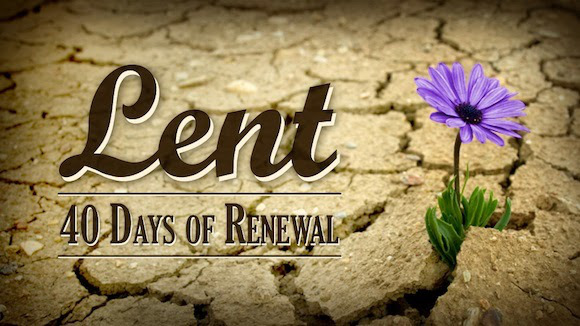 During this Lent, let your Spirit drive us into the wilderness
During this Lent, let your Spirit drive us into the wilderness
and keep us there for forty days,
where we will face up to the demons within us
and the wild beasts tearing at us,
knowing all the time that your angels are looking after us- renewing us.
Lord, we thank you in the name of all those for whom this Lent will be a season of grace, when Jesus will come into their lives.
They will know that the moment they were running away from has finally come,
a life of holiness will seem within their grasp,
they will turn away from their sin and give themselves trustingly to the new vision you have brought them to.
Lord, we thank you for those who continue to work for reconciliation
where there is hatred and violence:
– in Israel/Gaza,Palestine, the land of Jesus;
– between Iraq, Syria and the US;
– in Sri Lanka, in corners of Northern Ireland;
– in work places where workers and employers
share no trust;
– where racism divides people.
They are Jesus going into Galilee after John has been arrested, proclaiming
– that it is a moment not of despair but of grace;
– that love and harmony are real options;
– that people can put their trust in the victory of good over evil.
********************************************************
Thomas O’Loughlin
Liturgical Resources for the Year of Matthew
www.columba.ie
Introduction to the Celebration
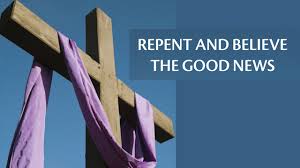 At the beginning of Lent we hear the call that introduces the message of Jesus: ‘Repent and believe in the Good News.’ This next few weeks will be a time of refreshment, a time of repentance that prepares us for Easter when we will renew our commitment to believing in the Good News of God’s love. So now, let us pause and take heed that we are entering Lent and ask ourselves whether we are open to be really changed as people over the next few weeks.
At the beginning of Lent we hear the call that introduces the message of Jesus: ‘Repent and believe in the Good News.’ This next few weeks will be a time of refreshment, a time of repentance that prepares us for Easter when we will renew our commitment to believing in the Good News of God’s love. So now, let us pause and take heed that we are entering Lent and ask ourselves whether we are open to be really changed as people over the next few weeks.
HOMILY NOTES
1. It is sobering to note that most of those who train people in communications or teaching techniques regard the standard format of the homily/sermon as the least useful way to teach. They usually give these reasons:
(1) people have a felt expectation that the sermon is going to be ‘boring‘ or of little value;
(2) the group are passive listeners;
(3) the structure of the ritual allows little variation;
(4) there is often a culture gap between the preacher and the majority of the congregation;
(5) you have only, usually, your voice without other props or communications tools to convey your message;
(6)there is such a wide range of people and expectations that inevitably some will believe that you are irrelevant, ‘over their heads‘ or, conversely, patronising; and
(7) the time allowed is neither short enough for a ‘quick thought for the day’ (which inevitably then is lost amid the other words of the Liturgy of the Word) nor long enough to produce a succinct piece of teaching. We have inherited the format of the homily at the Eucharist from a different communications culture and from the age before print, and so we are stuck with it; we would never invent it or anything like it today.
 2. It can, therefore, be valuable on occasion to break with the homily format altogether and embark on a completely different communications strategy. The brevity and directness of today’s gospel make it a good day to try out this method (common in almost every other face-to-face communication environment today) whose aim is to awaken people to the importance they attach to a particular topic in their lives. Ask each person to turn to someone near them, preferably not someone they are related to, and express to that person (1) what Lent means to them, and
2. It can, therefore, be valuable on occasion to break with the homily format altogether and embark on a completely different communications strategy. The brevity and directness of today’s gospel make it a good day to try out this method (common in almost every other face-to-face communication environment today) whose aim is to awaken people to the importance they attach to a particular topic in their lives. Ask each person to turn to someone near them, preferably not someone they are related to, and express to that person (1) what Lent means to them, and
(2) what Jesus’s opening call means to them. Tell them that after five minutes you will ring the sanctuary bell to end the discussion.
3. This method will shock some, embarrass others, and infuriate those who imagine Christian faith as simply down-loading ‘facts‘ from a professional, or imagine liturgy as a purely private affair where they can ignore others in the assembly in the same way we ignore people with whom we have to share a bus. However, it should make many aware that it is only by thinking and talking about most aspects of life that we begin to understand and see what must be done. This activity of sharing may make more learning and understanding take place than any amount of preaching by a preacher.
 4. Conclude by acknowledging that it may have been difficult, while reminding everyone that they are the people chosen to proclaim Christ’s call to repent and believe, and that it is a task for life and not just five minutes. But make sure that your closing statement takes no more than a minute or you will be giving, in effect a minor homily.
4. Conclude by acknowledging that it may have been difficult, while reminding everyone that they are the people chosen to proclaim Christ’s call to repent and believe, and that it is a task for life and not just five minutes. But make sure that your closing statement takes no more than a minute or you will be giving, in effect a minor homily.
**************************************************
Sean Goan
Let the Reader Understand
www.columba.ie
Gospel Notes Mark 1:12-15
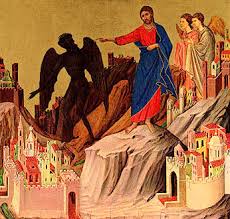 The gospel for the First Sunday of Lent is always the story of the temptation in the wilderness, and in Mark the account is particularly brief. That said, it is remarkable what the evangelist can pack into just three verses. In the scene just prior to this, Jesus has heard the voice of God telling him that he is the beloved son and in the strength of this affirmation we now see Jesus ‘driven’ out into the wilderness. One of the characteristics of Mark is a sense of urgency throughout the narrative. Things move quickly as the mystery of the kingdom present in the person of Jesus unfolds. We are told that in the wilderness for forty days Jesus was tempted but we are not told how. However, the language echoes the Old Testament story of the chosen people and their desert experience of testing. Jesus in his life, death and resurrection confronts and is victorious over the power of evil. After his testing he returns and begins his ministry with one simple appeal: ‘Repent and believe the good news.’ This appeal sets the tone for our observance of Lent as we make ourselves available to God through our mini desert experience.
The gospel for the First Sunday of Lent is always the story of the temptation in the wilderness, and in Mark the account is particularly brief. That said, it is remarkable what the evangelist can pack into just three verses. In the scene just prior to this, Jesus has heard the voice of God telling him that he is the beloved son and in the strength of this affirmation we now see Jesus ‘driven’ out into the wilderness. One of the characteristics of Mark is a sense of urgency throughout the narrative. Things move quickly as the mystery of the kingdom present in the person of Jesus unfolds. We are told that in the wilderness for forty days Jesus was tempted but we are not told how. However, the language echoes the Old Testament story of the chosen people and their desert experience of testing. Jesus in his life, death and resurrection confronts and is victorious over the power of evil. After his testing he returns and begins his ministry with one simple appeal: ‘Repent and believe the good news.’ This appeal sets the tone for our observance of Lent as we make ourselves available to God through our mini desert experience.
Reflection
The challenge that is put to us not just this week but every time we gather is to believe the good news. We are not being told to perform heroic deeds of self-sacrifice or to overcome and master our sinfulness; no, we are being challenged to really hear and believe that through baptism we have become children of God and that God says to each of us: ‘You are my beloved.’  It is hard to really accept this and there are many voices that try to convince us that it is not the truth. So Lent is a wonderful opportunity to rediscover our worth and the wonder of coming to life in Christ. The readings today challenge us not to focus on storm clouds but to see in the rainbow the beautiful faithfulness of God. Let that be the focus of all we undertake during this season of repentance.
It is hard to really accept this and there are many voices that try to convince us that it is not the truth. So Lent is a wonderful opportunity to rediscover our worth and the wonder of coming to life in Christ. The readings today challenge us not to focus on storm clouds but to see in the rainbow the beautiful faithfulness of God. Let that be the focus of all we undertake during this season of repentance.
********************************
Donal Neary SJ
Gospel Reflections
www.messenger.ie/bookshop/
What my Lent does for others
Every Lent is a new beginning; sometimes beginnings are welcomed, other times half and half! We welcome Lent as a time to make our faith fresh, but we know from other Lents that it’s hard to keep going, and it’s for a long time! We might ask ourselves what Lent is really for.

Jesus forgives the repentant thief
The focus of Lent is not on what we give up but on what we are given. We focus our minds on the self-giving love of Jesus which we will celebrate in Holy Week. We allow ourselves believe in this love. Often it’s difficult to believe in the tender love of God. This conquers all else in the world; it is given in the mercy and compassion of God.
Lent pours the grace of forgiveness into our world, needed individually and as a people. We need to know that God is bigger than any of our sins, wars, violence and hatred. God wants his kingdom to come now. Lent is our time of saying ‘yes’ to a partnership with God in saving the world from the effects of evil and sin.
Maybe we can ask what our Lent does for others than just what we are doing for Lent. It is a time of renewal, then it shows in love, forgiveness and care of others in our lives
Pray a bit every day,
read a bit of the gospel every day,
do something good for another every day –
this is the way to share in the saving love of God.
Lord, by your cross and resurrection you have set us free,
you are the Saviour of the world.
*******************